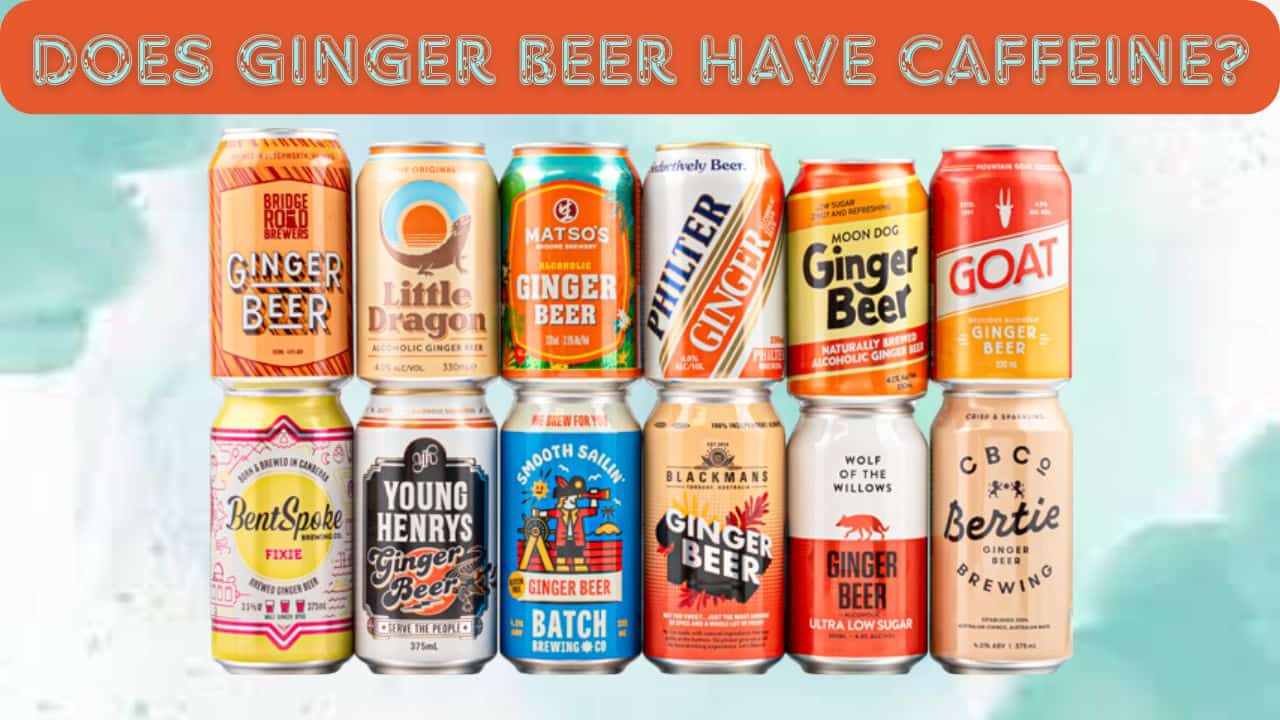Written By: Sherry Harris
Ginger beer is a popular beverage with a spicy kick, but does it contain caffeine? While the name might suggest otherwise, ginger beer is quite different from traditional beer or sodas like cola. Whether you’re sipping it on its own or using it as a mixer for cocktails, knowing what’s inside your drink is essential.
In this article, we’ll delve into the ingredients, production process, and variations of ginger beer, and answer the all-important question: Does ginger beer have caffeine?
What Is Ginger Beer?
Ginger beer is a non-alcoholic beverage that has roots dating back to the 18th century in England. Originally, it was a fermented drink with a low alcohol content, made from water, sugar, ginger, and sometimes lemon juice. Over time, the recipe evolved, and today, most commercial ginger beers are non-alcoholic and carbonated, similar to soft drinks.
Unlike ginger ale, which is a simple carbonated beverage flavored with ginger, ginger beer is brewed and fermented, giving it a more robust flavor profile. This brewing process, while giving ginger beer its distinctive taste, also means that it’s generally caffeine-free.
Does ginger beer have caffeine?
Does ginger beer have caffeine? NO, Ginger beer does not contain caffeine. It’s made from ginger, sugar, and water through a brewing and fermentation process, which results in a flavorful, spicy beverage without any caffeine. This makes it a great option for those looking to avoid caffeine.
Ginger Beer Variants
Ginger beer comes in various forms, each with distinct characteristics, but one thing they generally have in common is the absence of caffeine. Here’s a closer look at different ginger beer variants and their caffeine content:
1. Traditional Non-Alcoholic Ginger Beer
Traditional ginger beer is brewed and fermented using natural ingredients like ginger root, sugar, and water. This process gives it a strong, spicy flavor and a natural effervescence. Traditional non-alcoholic ginger beer does not contain caffeine.
2. Alcoholic Ginger Beer
This variant is similar to traditional ginger beer but undergoes a longer fermentation process, resulting in an alcoholic beverage with a typical alcohol content of 4-5% ABV. It is popular in places like the UK and Australia. Even though it contains alcohol, caffeine is not added during the brewing process, so alcoholic ginger beer remains caffeine-free.
3. Craft Ginger Beer
Craft ginger beer is made by small-scale brewers who often emphasize natural, high-quality ingredients and traditional brewing methods. These ginger beers may vary in flavor, spice level, and sweetness depending on the brewer’s recipe. Like other ginger beer variants, craft ginger beer is brewed using caffeine-free.
4. Diet or Low-Sugar Ginger Beer
Diet or low-sugar ginger beers are designed for consumers looking to reduce their sugar intake. These versions use alternative sweeteners like stevia or artificial sweeteners to provide sweetness without the added sugar. These variants also remain caffeine-free.
5. Flavored Ginger Beer
Some ginger beer brands offer flavored versions, where additional ingredients like fruit juices (e.g., lemon, lime, or raspberry) or spices (e.g., cinnamon or cloves) are added to enhance the taste. Despite the added flavors, the base ingredients of ginger beer remain the same, meaning these variants do not contain caffeine.
Ginger Beer Nutritional Information
Ginger beer is a flavorful, non-alcoholic beverage that offers a spicy kick without the caffeine. However, it’s essential to understand its nutritional content, especially if you’re mindful of sugar intake. Here’s a brief overview of the typical nutritional facts for a standard serving of ginger beer.
| Nutrition Fact | Amount per Serving |
|---|---|
| Calories | 150-180 kcal |
| Total Fat | 0 g |
| Sodium | 20-30 mg |
| Total Carbohydrates | 38-45 g |
| Sugars | 35-42 g |
| Protein | 0 g |
| Caffeine | 0 mg |
These values can vary slightly depending on the brand and whether the ginger beer is regular or diet. Always check the label for the most accurate nutritional information.
You Know!
List of Ingredients in Ginger Beer
To understand whether ginger beer contains caffeine, we need to look at its ingredients. The primary components of ginger beer include:
- Ginger Root: The star ingredient, providing the spicy and warming flavor.
- Water: The base liquid for brewing.
- Sugar: Used in the fermentation process to create carbonation.
- Lemon or Lime Juice: Sometimes added for a tangy twist.
- Yeast: Essential for fermentation in traditional recipes.
- Carbonation: Added to give it a fizzy texture, though in traditional ginger beer, carbonation comes from natural fermentation.
None of these ingredients naturally contain caffeine. Unlike coffee, tea, or cola, which have caffeine naturally present or added during processing, ginger beer is free from such stimulants.
Alternatives to Ginger Beer and Their Caffeine Content
Ginger Ale
Ginger ale is a milder, carbonated soft drink flavored with ginger. It’s often used as a substitute for ginger beer in cocktails or as a standalone beverage. Like ginger beer, ginger ale typically contains no caffeine.
Club Soda
Club soda is a carbonated water that’s often used as a mixer in cocktails or enjoyed on its own. It has a neutral taste, making it versatile for various drinks. Club soda is completely caffeine-free.
Tonic Water
Tonic water is a carbonated beverage that contains quinine, giving it a slightly bitter taste. It’s commonly used in cocktails like the gin and tonic. Tonic water does not contain caffeine.
Lemon-Lime Soda
Lemon-lime sodas like Sprite or 7UP are sweet, citrus-flavored beverages often used as mixers or enjoyed on their own. These sodas are popular alternatives to ginger beer for those who prefer a sweeter, less spicy drink. They typically do not contain caffeine.
Root Beer
Root beer is a sweet, foamy soft drink with a distinct flavor derived from various roots and herbs. It’s often non-caffeinated, though some brands may add caffeine. Always check the label if you prefer a caffeine-free option.
Sparkling Water
Sparkling water is simply water that has been carbonated, making it a refreshing, bubbly drink. It’s a healthy alternative to sugary sodas and ginger beer. Most sparkling waters are free of caffeine, but some flavored varieties might have added caffeine.
Here’s a consolidated table summarizing the caffeine content of the ginger beer alternatives mentioned:
| Beverage Type | Caffeine Content |
|---|---|
| Ginger Ale | Caffeine-free |
| Club Soda | Caffeine-free |
| Tonic Water | Caffeine-free |
| Lemon-Lime Soda | Caffeine-free |
| Root Beer | 0-45 mg (varies by brand) |
| Sparkling Water | 0 mg (unless flavored) |
You Know!
Health Benefits of Ginger Beer
Ginger beer is more than just a refreshing drink; it can also offer several health benefits due to its ginger content. Ginger has long been known for its medicinal properties, particularly in aiding digestion and reducing nausea.
Digestive Aid
Ginger is known to stimulate digestion and can help alleviate symptoms of indigestion, bloating, and gas. Drinking ginger beer, especially after a meal, may help promote better digestion.
Nausea Relief
Ginger is a natural remedy for nausea, making ginger beer a popular choice for those experiencing motion sickness or morning sickness during pregnancy. However, it’s important to choose a ginger beer with real ginger content for this benefit.
Anti-Inflammatory Properties
Ginger contains compounds called gingerols, which have anti-inflammatory properties. Regular consumption of ginger in your diet, including through ginger beer, may help reduce inflammation in the body.
Choosing the Best Ginger Beer
When selecting a ginger beer, there are several factors to consider to ensure you’re getting a high-quality product, especially if you’re wondering, “Does ginger beer have caffeine?“
Ingredients: Look for ginger beers that use real ginger root, natural sweeteners, and minimal additives. The more natural the ingredients the better the flavor and potential health benefits. Avoid ginger beers that rely on artificial flavors or excessive sugars, as these can diminish the authentic ginger experience and may not provide the same digestive benefits.
Spice Level: Ginger beer can range from mildly spiced to extremely fiery. Consider your spice tolerance when choosing a ginger beer. If you’re new to ginger beer, you might want to start with a milder option and gradually move to spicier varieties as you develop a taste for it.
Alcohol Content: If you’re looking for a non-alcoholic option, ensure the ginger beer you choose is labeled as such. Alcoholic ginger beers will have the alcohol content (ABV) clearly marked on the label, typically around 4-5% ABV. Non-alcoholic ginger beers usually contain less than 0.5% ABV, making them a safe choice for all ages.
Conclusion
Does Ginger Beer Have Caffeine? In summary, ginger beer does not contain caffeine. Whether you’re enjoying it on its own, using it as a mixer, or sipping it for its potential health benefits, you can rest assured that ginger beer is a caffeine-free beverage.
Whether you’re a fan of the spicy kick of traditional ginger beer or prefer a milder, more carbonated version, there’s a ginger beer out there for everyone. Just be mindful of the ingredients, production process, and any potential health considerations when choosing your perfect ginger beer.
So next time you reach for a refreshing ginger beer, you’ll know exactly what’s inside—and what’s not. Enjoy the bold, spicy flavors without worrying about caffeine or artificial additives, and explore the world of ginger beer with confidence and enthusiasm.
FAQS
Q. Is Ginger Beer the Same as Ginger Ale?
No, ginger beer and ginger ale are different beverages. Ginger beer is brewed and fermented, giving it a stronger, spicier flavor, while ginger ale is a milder, carbonated soft drink that’s simply flavored with ginger.
Q. Does Ginger Beer Have Alcohol?
Most ginger beers on the market today are non-alcoholic, containing less than 0.5% alcohol by volume (ABV), which is considered negligible.
Q. Is Ginger Beer Good for Your Health?
Ginger beer can offer some health benefits, mainly due to the presence of ginger. Ginger is known for its digestive properties, helping with nausea and indigestion, and it also has anti-inflammatory effects.
Q. Can I Drink Ginger Beer During Pregnancy?
Yes, non-alcoholic ginger beer can be safe to drink during pregnancy, and it may even help alleviate nausea and morning sickness due to the ginger content.
Q. How Should I Store Ginger Beer?
Ginger beer should be stored in a cool, dark place, such as a pantry or refrigerator, to preserve its flavor and carbonation. Avoid exposing it to direct sunlight or heat, as this can cause the drink to lose its fizz and freshness.

